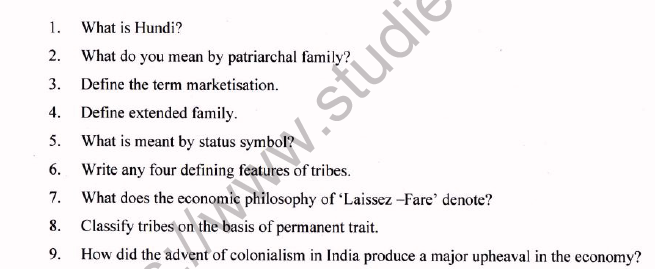
VALUE POINTS
1. An important instrument of exchange and credit was the hundi, or bill of exchange (like a credit note), which allowed merchants to engage in long-distance trade.
2. A patriarchal family structure exists where the men exercise authority and dominance.
3. The use of markets or market-based processes (rather than government regulations or policies) to solve social, political, or economic problems. These include relaxation or removal of economic controls (deregulation), privatisation of industries, and removing government controls over wages and prices.
4. Extended family where that is more than one couple and after more than two generations living together.
5. Max Weber, was among the first to point out that the goods that people buy and use are closely related to their status in society. He coined the term status symbol to describe this relationship. For example, among the middle class in India today, the brand of cell phone or the model of car that one owns are important markers of socio-economic status.
6. a. The oldest inhabitants of the sub-continent.
b. Tribes were communities that did not practice a religion with a written text.
c. They did not have a state or political form of the formal kind.
d. They did not have sharp class divisions; and did not have caste distinctions.
7. Smith supported the idea of a ‘free market’, that is, a market free from all kinds of regulation whether by the state or otherwise. This economic philosophy was also given the name laissez-faire, a French phrase that means ‘leave alone’ or ‘let it be’.
8. Permanent trait:-
a). On the basis of location.
b) On the basis of language.
c) On the basis of physical and racial.
d) On the basis of size.
(Explain these points with examples)
9. The advent of colonialism in India produced major upheavals in the economy, causing disruptions in production, trade, and agriculture. In the colonial era India began to be more fully linked to the world capitalist economy. Before being colonised by the British, India was a major supplier of manufactured goods to the world market. After colonisation, she became a source of raw materials and agricultural products and a consumer of manufactured goods, both largely for the benefit of industrialising England.
But rather than completely overturning existing economic institutions, the expansion of the market economy in India provided new opportunities to some merchant communities, which were able to improve their position by re-orienting themselves to changing economic circumstances. In some cases, new communities emerged to take advantage of the economic opportunities provided by colonialism A good example of this process is provided by the Marwaris, probably the most widespread and best-known business community in India.
Please click on below link to download CBSE Class 12 Sociology Worksheet Set E

